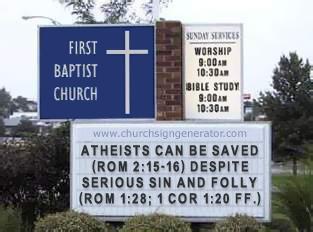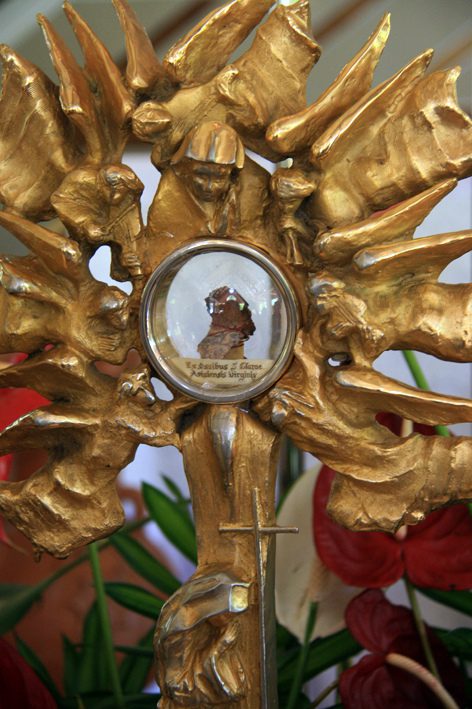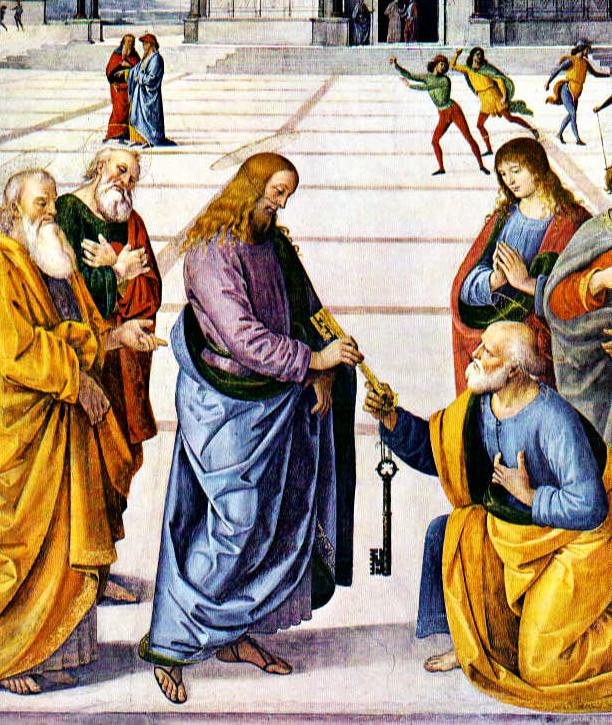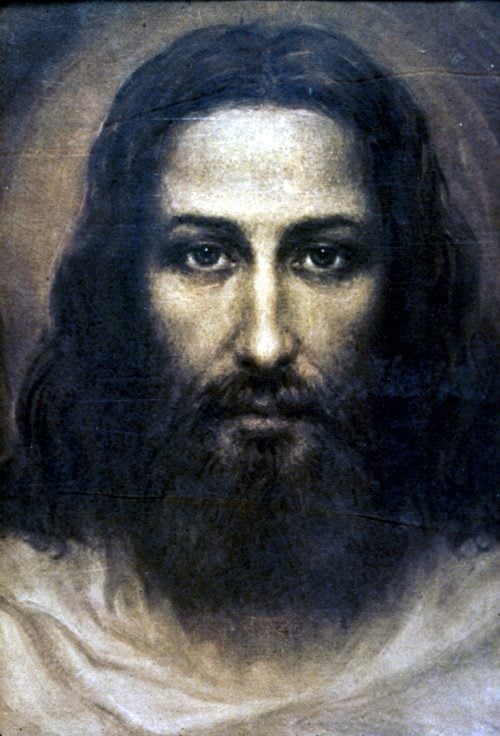Christ Crowned with Thorns (c. 1633-1639), by Matthias Stom (fl. 1615-1649) [public domain /
Wikimedia Commons]
(1982; slightly revised in 1997)
[KJV unless indicated otherwise]
[this research was updated and switched to (mostly) RSV in my 2012 book,
Theology of God]
C O N T E N T S
I. DIRECT STATEMENTS OF JESUS’ EQUALITY WITH GOD THE FATHER
II. JESUS IS THE CREATOR
III. JESUS IS ETERNAL AND UNCREATED
IV. JESUS IS WORSHIPED
V. JESUS IS OMNIPOTENT (ALL-POWERFUL)
VI. JESUS IS OMNISCIENT (ALL-KNOWING)
VII. JESUS IS OMNIPRESENT (PRESENT EVERYWHERE)
VIII. JESUS FORGIVES SINS IN HIS OWN NAME
IX. JESUS RECEIVES PRAYER
X. JESUS IS SINLESS AND PERFECT
XI. THE PRIMACY OF THE NAME OF JESUS
XII. JESUS CLAIMED TO BE THE MESSIAH (CHRIST)
XIII. FIFTY O.T. MESSIANIC PROPHECIES FULFILLED BY JESUS
XIV. JESUS’ SUBJECTION (AS MESSIAH) TO THE FATHER
I. DIRECT STATEMENTS OF JESUS’ EQUALITY WITH GOD THE FATHER
A. Jesus’ Own Words
1) MATTHEW 4:7 Jesus said unto him, It is written again, Thou shalt not tempt the Lord thy God. {the devil was tempting Jesus Himself}
2) MATTHEW 10:40 . . . he that receiveth me receiveth him that sent me.
3) MATTHEW 11:27 All things are delivered unto me of my Father: and no man knoweth the Son, but the Father; neither knoweth any man the Father, save the Son, and {he} to whomsoever the Son will reveal {him}.
4) MATTHEW 13:13-15 Therefore speak I to them in parables: because they seeing see not; and hearing they hear not, neither do they understand. (14) And in them is fulfilled the prophecy of Esaias, which saith, By hearing ye shall hear, and shall not understand; and seeing ye shall see, and shall not perceive: (15) For this people’s heart is waxed gross, and {their} ears are dull of hearing, and their eyes they have closed; lest at any time they should see with {their} eyes, and hear with {their} ears, and should understand with {their} heart, and should be converted, and I should heal them.
>>>ISAIAH 6:9-10 And he said, Go, and tell this people, Hear ye indeed, but understand not; and see ye indeed, but perceive not. (10) Make the heart of this people fat, and make their ears heavy, and shut their eyes; lest they see with their eyes, and hear with their ears, and understand with their heart, and convert, and be healed.<<<
5) MARK 9:37 Whosoever shall receive one of such children in my name, receiveth me: and whosoever shall receive me, receiveth not me, but him that sent me.
6) JOHN 5:17-21 But Jesus answered them, My Father worketh hitherto, and I work. (18) Therefore the Jews sought the more to kill him, because he not only had broken the sabbath, but said also that God was his Father, making himself equal with God. (19) Then answered Jesus and said unto them, Verily, verily, I say unto you, The Son can do nothing of himself, but what he seeth the Father do: for what things soever he doeth, these also doeth the Son likewise. (20) For the Father loveth the Son, and sheweth him all things that himself doeth: and he will shew him greater works than these, that ye may marvel. (21) For as the Father raiseth up the dead, and quickeneth {them}; even so the Son quickeneth whom he will.
7) JOHN 5:26 For as the Father hath life in himself; so hath he given to the Son to have life in himself;
8) JOHN 7:29 But I know him: for I am from him, and he hath sent me.
9) JOHN 8:24 I said therefore unto you, that ye shall die in your sins: for if ye believe not that I am {he}, ye shall die in your sins.
10) JOHN 8:28 Then said Jesus unto them, When ye have lifted up the Son of man, then shall ye know that I am {he}, and {that} I do nothing of myself; but as my Father hath taught me, I speak these things.
11) JOHN 8:58 Jesus said unto them, Verily, verily, I say unto you, Before Abraham was, I am.
12) JOHN 10:30-33 I and {my} Father are one. (31) Then the Jews took up stones again to stone him. (32) Jesus answered them, Many good works have I shewed you from my Father; for which of those works do ye stone me? (33) The Jews answered him, saying, For a good work we stone thee not; but for blasphemy; and because that thou, being a man, makest thyself God.
13) JOHN 10:38 But if I do, though ye believe not me, believe the works: that ye may know, and believe, that the Father {is} in me, and I in him.
14) JOHN 12:44-45 Jesus cried and said, He that believeth on me, believeth not on me, but on him that sent me. (45) And he that seeth me seeth him that sent me.
15) JOHN 13:19 Now I tell you before it come, that, when it is come to pass, ye may believe that I am {he}.
16) JOHN 14:7-10 If ye had known me, ye should have known my Father also: and from henceforth ye know him, and have seen him. (8) Philip saith unto him, Lord, shew us the Father, and it sufficeth us. (9) Jesus saith unto him, have I been so long time with you, and yet hast thou not known me, Philip? he that hath seen me hath seen the Father; and how sayest thou {then}, Shew us the Father? (10) Believest thou not that I am in the Father, and the Father in me? the words that I speak unto you I speak not of myself: but the Father that dwelleth in me, he doeth the works.
17) JOHN 15:23 He that hateth me hateth my Father also.
18) JOHN 16:15 All things that the Father hath are mine: therefore said I, that he shall take of mine, and shall shew {it} unto you.
19) JOHN 17:10-11 And all mine are thine, and thine are mine; and I am glorified in them. (11) And now I am no more in the world, but these are in the world, and I come to thee. Holy Father, keep through thine own name those whom thou hast given me, that they may be one, as we {are}.
20) Use of “Father” Jesus constantly referred to God as “My Father” and claimed to have a unique relationship with Him. In Mark 14:36 He called God Abba, Aramaic for “daddy,” an absolutely unprecedented address of God {cf. Rom 8:15, Gal 4:6}. And He says “My Father and Your Father” (Jn 20:17), not “our Father.” The Jews understood full well what Jesus was implying by repeatedly speaking of His singular relationship with God the Father, but thought this was blasphemy, since they didn’t believe that He Himself was God the Son {cf. Jn 5:18, 10:33 above}.
21) Divine “I”Jesus teaches in His own authority (“I say to you”) in the Sermon on the Mount (Mt 5:18,20,22,26,28,32,34, etc.), and many other passages. The prophets, in contrast, spoke as God’s messengers in the second person (“The Lord says . . .”). He often talks in a way in which only God could speak. For instance, when He addresses the seven churches in the book of Revelation, He is clearly speaking to them as God (Rev 1:17-3:22). Perhaps the most striking example of this “Divine `I'” occurs in Matthew 23:34-39:
MATTHEW 23:34-39 Wherefore, behold, I send unto you prophets, and wise men, and scribes: and {some} of them ye shall kill and crucify; and {some} of them shall ye scourge in your synagogues, and persecute {them} from city to city: (35) That upon you may come all the righteous blood shed upon the earth, from the blood of righteous Abel unto the blood of Zacharias son of Barachias, whom ye slew between the temple and the altar. (36) Verily I say unto you, All these things shall come upon this generation. (37) O Jerusalem, Jerusalem, {thou} that killest the prophets, and stonest them which are sent unto thee, how often would I have gathered thy children together, even as a hen gathereth her chickens under {her} wings, and ye would not! (38) Behold, your house is left unto you desolate. (39) For I say unto you, Ye shall not see me henceforth, till ye shall say, Blessed {is} he that cometh in the name of the Lord.
JEREMIAH 22:5 But if ye will not hear these words, I swear by myself, saith the Lord, that this house shall become a desolation.<<
MATTHEW 7:21-22 Not every one that saith unto me, Lord, Lord, shall enter into the kingdom of heaven; but he that doeth the will of my Father which is in heaven. (22) Many will say to me in that day, Lord, Lord, have we not prophesied in thy name? and in thy name have cast out devils? and in thy name done many wonderful works?
B. N.T. Apostolic Witness
1) MATTHEW 1:23 Behold, a virgin shall be with child, and shall bring forth a son, and they shall call his name Emmanuel, which being interpreted is, God with us.
2) JOHN 1:1-4 In the beginning was the Word, and the Word was with God, and the Word was God. (2) The same was in the beginning with God. (3) All things were made by him; and without him was not any thing made that was made. (4) In him was life; and the life was the light of men.
3) JOHN 1:14 And the Word was made flesh, and dwelt among us, (and we beheld his glory, the glory as of the only begotten of the Father,) full of grace and truth.
4) JOHN 1:18 No man hath seen God at any time; the only begotten Son, which is in the bosom of the Father, he hath declared {him}.
5) Monogenes (“Only Begotten”) The phrase “only begotten (Son)” (also used in Jn 3:16,18 and 1 Jn 4:9) is the Greek monogenes, which means, according to any Greek lexicon, “unique, only member of a kind.” It does not mean “created,” as some (e.g., Jehovah’s Witnesses) falsely interpret it. Christ is the eternal Son of God, and as such, possesses every attribute of pure Godhood, just as a human son partakes fully of humanness.
6) JOHN 12:37-38 But though he had done so many miracles before them, yet they believed not on him: (38) That the saying of Esaias the prophet might be fulfilled, which he spake, Lord, who hath believed our report? and to whom hath the arm of the Lord been revealed? {cf. 12:39-40}
7) JOHN 12:41 These things said Esaias, when he saw his glory, and spake of him.
ISAIAH 6:1-5 In the year that king Uzziah died I saw also the Lord sitting upon a throne, high and lifted up, and his train filled the temple. (2) Above it stood the seraphims: each one had six wings; with twain he covered his face, and with twain he covered his feet, and with twain he did fly. (3) And one cried unto another, and said, Holy, holy, holy, {is} the Lord of hosts: the whole earth {is} full of his glory. (4) And the posts of the door moved at the voice of him that cried, and the house was filled with smoke. (5) Then said I, Woe {is} me! for I am undone; because I {am} a man of unclean lips, and I dwell in the midst of a people of unclean lips: for mine eyes have seen the King, the Lord of hosts.
8) JOHN 20:28 And Thomas answered and said unto him, My Lord and my God.
9) ACTS 20:28 Take heed therefore unto yourselves, and to all the flock, over the which the Holy Ghost hath made you overseers, to feed the church of God, which he hath purchased with his own blood.
10) ROMANS 9:5 Whose {are} the fathers, and of whom as concerning the flesh Christ {came}, who is over all, God blessed for ever. Amen. {RSV, NIV: “Christ, who is God over all”}
11) PHILIPPIANS 2:5-6 Let this mind be in you, which was also in Christ Jesus: (6) Who, being in the form of God, thought it not robbery to be equal with God:
12) COLOSSIANS 1:15-19 Who is the image of the invisible God, the firstborn of every creature: (16) For by him were all things created, that are in heaven, and that are in earth, visible and invisible, whether {they be} thrones, or dominions, or principalities, or powers: all things were created by him, and for him: (17) And he is before all things, and by him all things consist. (18) And he is the head of the body, the church: who is the beginning, the firstborn from the dead; that in all {things} he might have the preeminence. (19) For it pleased {the Father} that in him should all fulness dwell.
13) Prototokos (“Firstborn”) The Greek for “firstborn” is prototokos, which means “preeminence” and “eternal preexistence,” according to Greek lexicons. It does not mean “first-created.” Apart from being untrue linguistically, this heretical interpretation is contradicted in the next two verses, which inform us that Christ “created all things,” and that He “is before all things.” The Hebrew usage of “firstborn” is also instructive, since it illustrates its meaning as “preeminent.” David is called “firstborn” in Ps 89:27, not because he was the literal first child of Jesse (for he was the youngest), but in the sense of his ascendancy to the kingship of Israel. Likewise, Jeremiah 31:9 refers to Ephraim as the firstborn, whereas Manasseh was the first child born (Gen 41:50-52). The nation Israel is called “my firstborn” by God (Ex 4:22). The Jewish rabbinical writers even called God the Father Bekorah Shelolam, meaning “firstborn of all creation,” that is, the Creator. This is precisely how St. Paul uses the “firstborn” phraseology in Col 1:15.
14) COLOSSIANS 2:9-10 For in him dwelleth all the fulness of the Godhead bodily. (10) And ye are complete in him, which is the head of all principality and power:
15) 1 TIMOTHY 3:16 And without controversy great is the mystery of godliness: God was manifest in the flesh, justified in the Spirit, seen of angels, preached unto the Gentiles, believed on in the world, received up into glory.
16) TITUS 2:13 Looking for that blessed hope, and the glorious appearing of the great God and our Saviour Jesus Christ; {RSV,NIV: “our great God and Saviour Jesus Christ”}
17) HEBREWS 1:3 Who being the brightness of {his} glory, and the express image of his person, and upholding all things by the word of his power, when he had by himself purged our sins, sat down on the right hand of the Majesty on high;
18) HEBREWS 1:8 But unto the Son {he saith}, Thy throne, O God, {is} for ever and ever: a sceptre of righteousness {is} the sceptre of thy kingdom. {God the Father calls the Son God – a citation of Ps 45:6-7}
19) 2 PETER 1:1 Simon Peter, a servant and an apostle of Jesus Christ, to them that have obtained like precious faith with us through the righteousness of God and our Saviour Jesus Christ: {RSV, NIV: “our God and Saviour Jesus Christ”}
20) 1 JOHN 5:20 And we know that the Son of God is come, and hath given us an understanding, that we may know him that is true, and we are in him that is true, {even} in his Son Jesus Christ. This is the true God, and eternal life. {NIV: “He is the true God”}
II. JESUS IS THE CREATOR
A. God Alone is the Creator
1) GENESIS 1:1 In the beginning God created the heaven and the earth.
2) GENESIS 1:27 So God created man in his {own} image, in the image of God created he him; male and female created he them.
3) NEHEMIAH 9:6 Thou, {even} thou, {art} Lord alone; thou hast made heaven, the heaven of heavens, with all their host, the earth, and all {things} that {are} therein, the seas, and all that {is} therein, and thou preservest them all; and the host of heaven worshippeth thee.
4) JOB 9:2,8 . . . how should man be just with God? . . . (8) Which alone spreadeth out the heavens . . .
5) PSALM 33:6 By the word of the Lord were the heavens made; and all the host of them by the breath of his mouth.
6) ISAIAH 42:5 Thus saith God the Lord, he that created the heavens, and stretched them out; he that spread forth the earth, and that which cometh out of it; he that giveth breath unto the people upon it, and spirit to them that walk therein:
7) ISAIAH 44:24 Thus saith the Lord, thy redeemer, and he that formed thee from the womb, I {am} the Lord that maketh all {things}; that stretcheth forth the heavens alone; that spreadeth abroad the earth by myself;
8) MALACHI 2:10 Have we not all one father? hath not one God created us? . . .
9) ROMANS 11:36 For of him, and through him, and to him, {are} all things: to whom {be} glory for ever. Amen.
10) HEBREWS 2:10 For it became him, for whom {are} all things, and by whom {are} all things, . . .
B. N.T. Apostolic Witness
1) JOHN 1:3 All things were made by him; and without him was not any thing made that was made.
2) JOHN 1:10 . . . the world was made by him, . . .
3) 1 CORINTHIANS 8:6 But to us {there is but} one God, the Father, of whom {are} all things, and we in him; and one Lord Jesus Christ, by whom {are} all things, and we by him.
4) EPHESIANS 3:9 . . . God, who created all things by Jesus Christ:
5) COLOSSIANS 1:16 For by him were all things created, that are in heaven, and that are in earth, visible and invisible, whether {they be} thrones, or dominions, or principalities, or powers: all things were created by him, and for him:
6) HEBREWS 1:2 . . . {his} Son, whom he hath appointed heir of all things, by whom also he made the worlds;
7) HEBREWS 1:10 And, Thou, Lord, in the beginning hast laid the foundation of the earth; and the heavens are the works of thine hands: {God the Father calls the Son “Lord.” Ps 102:25 is cited}
8) REVELATION 3:14 And unto the angel of the church of the Laodiceans write; these things saith the Amen, the faithful and true witness, the beginning of the creation of God;
9) Arche (“Beginning”) The Greek for “beginning” is arche, from which we get our word “architect.” Its literal meaning, according to Greek scholars, is “origin, active cause, source, uncreated principle.” So the above verse is describing Jesus as the “architect,” or Creator of the Universe. In Rev 21:6 “arche” is applied to the Father, so it can’t possibly mean “created being,” as Jehovah’s Witnesses and other heretics maintain.
III. JESUS IS ETERNAL AND UNCREATED
A. God Alone is Eternal and Uncreated
1) GENESIS 21:33 . . . the Lord, the everlasting God.
2) EXODUS 3:14 And God said unto Moses, I AM THAT I AM: and he said, Thus shalt thou say unto the children of Israel, I AM hath sent me unto you.
3) DEUTERONOMY 33:27 The eternal God {is thy} refuge, and underneath {are} the everlasting arms: . . .
4) PSALM 90:2 . . . even from everlasting to everlasting, thou {art} God.
5) PSALM 93:2 Thy throne {is} established of old: thou {art} from everlasting.
6) ISAIAH 40:28 . . . the everlasting God, the Lord, the Creator of the ends of the earth, . . .
7) ISAIAH 44:6 Thus saith the Lord the King of Israel, and his redeemer the Lord of hosts; I {am} the first, and I {am} the last; and beside me {there is} no God.
8) ISAIAH 57:15 For thus saith the high and lofty One that inhabiteth eternity, whose name {is} Holy; . . .
9) HABAKKUK 1:12 {Art} thou not from everlasting, O Lord my God, mine Holy One? . . .
10) MALACHI 3:6 For I {am} the Lord, I change not; . . .
11) ROMANS 16:26 . . . the everlasting God, . . .
12) 1 TIMOTHY 1:17 . . . the King eternal, immortal, invisible, the only wise God, . . .
B. Jesus’ Own Words
1) JOHN 5:26 For as the Father hath life in himself; so hath he given to the Son to have life in himself;
2) JOHN 8:58 Jesus said unto them, Verily, verily, I say unto you, Before Abraham was, I am.
3) REVELATION 1:17-18 Fear not; I am the first and the last: (18) I {am} he that liveth, and was dead; and, behold, I am alive for evermore, Amen; and have the keys of hell and of death.
4) REVELATION 22:13 I am Alpha and Omega, the beginning and the end, the first and the last.
C. O.T. Prophecy and N.T. Apostolic Witness
1) ISAIAH 9:6 For unto us a child is born, unto us a son is given: and the government shall be upon his shoulder: and his name shall be called Wonderful, Counseller, The mighty God, the everlasting Father, The Prince of Peace.
{God the Father is called “Mighty God” (the same phrase in Hebrew, El Gibbor) at Deut 10:17, Neh 9:32, Is 10:21, and Jer 32:18. Likewise, the word for “everlasting,” ad, is applied to God the Father in Isaiah 57:15}
2) MICAH 5:2 But thou, Bethlehem Ephratah, {though} thou be little among the thousands of Judah, {yet} out of thee shall he come forth unto me {that is} to be ruler in Israel; whose goings forth {have been} from of old, from everlasting.
{The Hebrew word for “everlasting” here is olam, and it is often used in the most explicit way to describe God the Father’s eternal existence (e.g., Ps 41:13, 90:2, 93:2, 106:48, Is 40:28). If this word means “eternal and uncreated” when applied to God the Father (YHWH), then it must mean the same thing when it is applied to Jesus}
3) JOHN 1:1 In the beginning was the Word, and the Word was with God, and the Word was God.
4) COLOSSIANS 1:17 And he is before all things, and by him all things consist.
5) HEBREWS 13:8 Jesus Christ the same yesterday, and to day, and for ever.
6) 1 JOHN 1:1 That which was from the beginning, which we have heard, which we have seen with our eyes, which we have looked upon, and our hands have handled, of the Word of life;
D. Jesus’ Preexistence in Heaven: His Own Words
1) JOHN 4:34 Jesus saith unto them, My meat is to do the will of him that sent me, and to finish his work.
2) JOHN 6:29 Jesus answered and said unto them, This is the work of God, that ye believe on him whom he hath sent.
3) JOHN 6:32-33 Then Jesus said unto them, Verily, verily, I say unto you, Moses gave you not that bread from heaven; but my Father giveth you the true bread from heaven. (33) For the bread of God is he which cometh down from heaven, and giveth life unto the world.
4) JOHN 6:62 {What} and if ye shall see the Son of man ascend up where he was before?
5) JOHN 7:16 Jesus answered them, and said, My doctrine is not mine, but his that sent me.
6) JOHN 7:28-29 Then cried Jesus in the temple as he taught, saying, Ye both know me, and ye know whence I am: and I am not come of myself, but he that sent me is true, whom ye know not. (29) But I know him: for I am from him, and he hath sent me.
7) JOHN 8:16 And yet if I judge, my judgment is true: for I am not alone, but I and the Father that sent me.
8) JOHN 8:23 And he said unto them, Ye are from beneath; I am from above: ye are of this world; I am not of this world.
9) JOHN 8:29 And he that sent me is with me: the Father hath not left me alone; for I do always those things that please him.
10) JOHN 8:42 Jesus said unto them, If God were your Father, ye would love me: for I proceeded forth and came from God; neither came I of myself, but he sent me.
11) JOHN 17:5 And now, O Father, glorify thou me with thine own self with the glory which I had with thee before the world was.
12) JOHN 17:24 Father, I will that they also, whom thou hast given me, be with me where I am; that they may behold my glory, which thou hast given me: for thou lovedst me before the foundation of the world. {cf. Jn 5:30,36-38, 6:38,46,50,57-58, 7:18, 8:18,26}
E. Jesus’ Preexistence: N.T. Apostolic Witness
1) JOHN 3:13 And no man hath ascended up to heaven, but he that came down from heaven, {even} the Son of man which is in heaven. {cf. 13:3}
2) JOHN 3:31 He that cometh from above is above all: . . .
3) JOHN 3:34 For he whom God hath sent speaketh the words of God: . . .
4) EPHESIANS 4:10 He that descended is the same also that ascended up far above all heavens, that he might fill all things.
5) 1 PETER 1:20 Who verily was foreordained before the foundation of the world, but was manifest in these last times for you,
IV. JESUS IS WORSHIPED
A. God Alone is to be Worshiped
1) EXODUS 20:3 Thou shalt have no other gods before me.
2) DEUTERONOMY 6:13 Thou shalt fear the Lord thy God, and serve him, and shalt swear by his name.
3) NEHEMIAH 9:6 Thou, {even} thou, {art} Lord alone; . . . and the host of heaven worshippeth thee.
4) LUKE 4:8 And Jesus answered and said unto him, Get thee behind me, Satan: for it is written, Thou shalt worship the Lord thy God, and him only shalt thou serve. {cf. Mt 4:10}
5) REVELATION 4:9-11 And when those beasts give glory and honour and thanks to him that sat on the throne, who liveth for ever and ever, (10) The four and twenty elders fall down before him that sat on the throne, and worship him that liveth for ever and ever, and cast their crowns before the throne, saying, (11) Thou art worthy, O Lord, to receive glory and honour and power: for thou hast created all things, and for thy pleasure they are and were created.
{Worship of angels is condemned (Col 2:18), and angels refuse worship (Rev 19:10 and 22:8-9). Peter refuses worship (Acts 10:25-26), as do Paul and Barnabas (Acts 14:11-15) }
B. Jesus’ Own Words
1) JOHN 5:23 That all {men} should honour the Son, even as they honour the Father. He that honoureth not the Son honoureth not the Father which hath sent him.
C. Jesus Accepts Worship
1) MATTHEW 8:2 And, behold, there came a leper and worshipped him, . . .
2) MATTHEW 9:18 . . . there came a certain ruler, and worshipped him, . . .
3) MATTHEW 14:33 Then they that were in the ship came and worshipped him, saying, Of a truth thou art the Son of God.
4) MATTHEW 15:25 Then came she and worshipped him, saying, Lord, help me.
5) MATTHEW 20:20 Then came to him the mother of Zebedee’s children with her sons, worshipping {him}, . . .
6) MATTHEW 28:9 . . . And they came and held him by the feet, and worshipped him.
7) MATTHEW 28:17 And when they saw him, they worshipped him: but some doubted.
8) MARK 5:6 . . . he ran and worshipped him.
9) LUKE 24:52 And they worshipped him, . . .
10) JOHN 9:38 And he said, Lord, I believe. And he worshipped him.
11) JOHN 20:28 And Thomas answered and said unto him, My Lord and my God.
D. Jesus Worshiped as a Baby
1) MATTHEW 2:2 Saying, Where is he that is born King of the Jews? for we have seen his star in the east, and are come to worship him.
2) MATTHEW 2:11 And when they were come into the house, they saw the young child with Mary his mother, and fell down, and worshipped him: and when they had opened their treasures, they presented unto him gifts; gold, and frankincense, and myrrh.
E. N.T. Apostolic Witness
1) PHILIPPIANS 2:9-11 Wherefore God also hath highly exalted him, and given him a name which is above every name: (10) That at the name of Jesus every knee should bow, of {things} in heaven, and {things} in earth, and {things} under the earth; (11) And {that} every tongue should confess that Jesus Christ {is} Lord, to the glory of God the Father.
2) HEBREWS 1:6 And again, when he bringeth in the firstbegotten into the world, he saith, And let all the angels of God worship him.
3) REVELATION 5:8 . . . the four beasts and four {and} twenty elders fell down before the Lamb, having every one of them harps, and golden vials full of odours, which are the prayers of saints. {cf. Rev 4:10, 7:11}
4) REVELATION 5:12-14 Saying with a loud voice, Worthy is the Lamb that was slain to receive power, and riches, and wisdom, and strength, honour, and glory, and blessing. (13) And every creature which is in heaven, and on the earth, and under the earth, and such as are in the sea, and all that are in them, heard I saying, Blessing, and honour, and glory, and power, {be} unto him that sitteth upon the throne, and unto the Lamb for ever and ever. (14) And the four beasts said, Amen. And the four {and} twenty elders fell down and worshipped him that liveth for ever and ever. {cf. Rev 4:9,11, 7:12, Rom 11:33, Col 2:6-7}
5) REVELATION 7:9-12,15-17 After this I beheld, and, lo, a great multitude, which no man could number, of all nations, and kindreds, and people, and tongues, stood before the throne, and before the Lamb, clothed with white robes, and palms in their hands; (10) And cried with a loud voice, saying, Salvation to our God which sitteth upon the throne, and unto the Lamb. (11) And all the angels stood round about the throne, and {about} the elders and the four beasts, and fell before the throne on their faces, and worshipped God, (12) Saying, Amen: Blessing, and glory, and wisdom, and thanksgiving, and honour, and power, and might, {be} unto our God for ever and ever. Amen . . . (15) Therefore are they before the throne of God, and serve him day and night in his temple: and he that sitteth on the throne shall dwell among them. (16) They shall hunger no more, neither thirst any more; neither shall the sun light on them, nor any heat. (17) For the Lamb which is in the midst of the throne shall feed them, and shall lead them unto living fountains of waters: and God shall wipe away all tears from their eyes.
F. Worship of Jesus in the Book of Revelation
In the New Testament, the Greek word for “worship,” proskuneo, is used 22 times to refer to worship of the Father, five times of divine worship without specification, and 14 times in reference to worship of Jesus. Proskuneo is also explicitly defined, both in Revelation 4:10-11 and 7:11-12, since both passages define the worship of God by virtue of describing the words directed to God in praise and worship (“. . . worshipped God, saying . . .”). Every Greek word (eleven in all) applied to God the Father in this fashion in Revelation is applied to Jesus as well (eucharistia is used of Christ in Colossians). One word, ploutos, is applied to Jesus only in Revelation, and to the Father in Romans 11:33. There can be no stronger evidence that Jesus is to receive worship equally with His Father, thus making Him equal to the Father, and no less than fully God:
Greek: Pipto English (KJV): Fell down before
Father: Revelation 4:10, 7:11
Jesus: Revelation 5:8
Eulogia (Blessing)
Father: 5:13, 7:12
Jesus: 5:12-13
Doxa (Glory)
Father: 4:9,11, 5:13, 7:12
Jesus: 5:12-13
Sophia (Wisdom)
Father: 7:12
Jesus: 5:12
Time (Honour)
Father: 4:9,11, 5:13, 7:12
Jesus: 5:12-13
Dunamis (Power)
Father: 4:11, 7:12
Jesus: 5:12
Kratos (Power)
Father: 5:13
Jesus: 5:13
Ischus (Might)
Father: 7:12
Jesus: 5:12
Axios (Worthy)
Father: 4:11
Jesus: 5:12
Lambano (Receive)
Father: 4:11
Jesus: 5:12
Ploutos (Riches)
Father: (Romans 11:33)
Jesus: Rev 5:12
Eucharistia (Thanksgiving)
Father: 4:9, 7:12
Jesus: (Colossians 2:6-7)
Furthermore, by strong implication, Revelation 7:11-12 can be said to apply equally to Jesus as well, since the “Lamb” is mentioned in the immediate context (7:10,17). Rev 7:11 states, “. . . fell before the throne . . . and worshipped God,” while Rev 7:17 informs us of, “the Lamb which is in the midst of the throne . . .”
V. JESUS IS OMNIPOTENT (ALL-POWERFUL)
A. God Alone is Omnipotent
1) GENESIS 18:14 Is any thing too hard for the Lord? . . .
2) DEUTERONOMY 32:39 See now that I, {even} I, {am} he, and {there is} no god with me: I kill, and I make alive; I wound, and I heal: neither {is there any} that can deliver out of my hand.
3) NEHEMIAH 9:6 . . . thou hast made heaven, the heaven of heavens, with all their host, the earth, and all {things} that {are} therein, . . . and thou preservest them all . . .
4) JOB 11:10 If he cut off, and shut up, or gather together, then who can hinder him?
5) JOB 42:2 I know that thou canst do every {thing}, . . .
6) PSALM 33:9 For he spake, and it was {done}; he commanded, and it stood fast.
7) ISAIAH 26:4 . . . in the Lord Jehovah {is} everlasting strength:
8) ISAIAH 46:10 Declaring the end from the beginning, and from ancient times {the things} that are not {yet} done, saying, My counsel shall stand, and I will do all my pleasure:
9) JEREMIAH 32:17 Ah Lord God! . . . there is nothing too hard for thee:
10) MATTHEW 19:26 With men this is impossible; but with God all things are possible. {cf. Mk 10:27, Luk 1:37, 18:27}
11) ACTS 17:28 For in him we live, and move, and have our being; . . . For we are also his offspring.
12) ROMANS 1:20 . . . his eternal power and Godhead . . .
13) ROMANS 11:36 For of him, and through him, and to him, {are} all things: to whom {be} glory for ever. Amen.
14) 1 TIMOTHY 6:13 I give thee charge in the sight of God, who quickeneth all things, . . .
15) REVELATION 19:6 . . . the Lord God omnipotent reigneth.
16) REVELATION 21:22 . . . the Lord God Almighty . . .
{God the Father is called “Almighty” in many other verses: Gen 17:1, 28:3, 35:11, 43:14, 48:3, 49:25, Ex 6:3, Job 5:17, 6:4,14, 8:3,5, 21:15,20, 27:2,10-11,13, 31:2,35, etc., Ezek 10:5, 2 Cor 6:18, Rev 1:8, 4:8, 11:17, 15:3, 16:7,14, 19:15}
B. Jesus’ Own Words
1) MATTHEW 11:27 All things are delivered unto me of my Father: . . . {cf. Jn 16:15, 17:10}
2) MATTHEW 28:18 . . . All power is given unto me in heaven and in earth.
3) JOHN 2:19 Jesus answered and said unto them, Destroy this temple, and in three days I will raise it up.
4) JOHN 5:19-21 Then answered Jesus and said unto them, Verily, verily, I say unto you, The Son can do nothing of himself, but what he seeth the Father do: for what things soever he doeth, these also doeth the Son likewise. (20) For the Father loveth the Son, and sheweth him all things that himself doeth: and he will shew him greater works than these, that ye may marvel. (21) For as the Father raiseth up the dead, and quickeneth {them}; even so the Son quickeneth whom he will.
5) JOHN 6:40 . . . every one which seeth the Son, and believeth on him, may have everlasting life: and I will raise him up at the last day.
6) JOHN 10:17-18 . . . I lay down my life, that I might take it again. (18) No man taketh it from me, but I lay it down of myself. I have power to lay it down, and I have power to take it again. This commandment have I received of my Father.
7) REVELATION 1:18 I {am} he that liveth, and was dead; and, behold, I am alive for evermore, Amen; and have the keys of hell and of death.
8) REVELATION 3:7 . . . These things saith he that is holy, . . ., he that hath the key of David, he that openeth, and no man shutteth; and shutteth, and no man openeth;
C. O.T. Indications and N.T. Apostolic Witness
1) ISAIAH 9:6 . . . the government shall be upon his shoulder: and his name shall be called Wonderful, Counseller, The mighty God, the everlasting Father, The Prince of Peace.
2) JOHN 3:35 The Father loveth the Son, and hath given all things into his hand.
3) JOHN 13:3 Jesus knowing that the Father had given all things into his hands, . . .
4) PHILIPPIANS 3:20-21 . . . we look for the Saviour, the Lord Jesus Christ: (21) Who shall change our vile body, that it may be fashioned like unto his glorious body, according to the working whereby he is able even to subdue all things unto himself.
5) COLOSSIANS 1:17 . . . by him all things consist.
6) HEBREWS 1:3 . . . upholding all things by the word of his power, . . .
7) 1 PETER 3:22 Who is gone into heaven, and is on the right hand of God; angels and authorities and powers being made subject unto him.
8) REVELATION 19:15 And out of his mouth goeth a sharp sword, that with it he should smite the nations: and he shall rule them with a rod of iron: and he treadeth the winepress of the fierceness and wrath of Almighty God. {cf. Gen 17:1, 1 Cor 8:6}
VI. JESUS IS OMNISCIENT (ALL-KNOWING)
A. God Alone is Omniscient
1) 1 SAMUEL 16:7 . . . {the Lord seeth} not as man seeth; for man looketh on the outward appearance, but the Lord looketh on the heart.
2) 1 KINGS 8:39 . . . give to every man according to his ways, whose heart thou knowest; (for thou, {even} thou only, knowest the hearts of all the children of men;) {cf. 2 Chron 6:30}
3) 1 CHRONICLES 28:9 . . . the Lord searcheth all hearts, and understandeth all the imaginations of the thoughts: . . .
4) 2 CHRONICLES 16:9 For the eyes of the Lord run to and fro throughout the whole earth, to shew himself strong in the behalf of {them} whose heart {is} perfect toward him . . . {cf. Prov 15:3, Jer 32:19, Zech 4:10}
5) JOB 34:21 For his eyes {are} upon the ways of man, and he seeth all his goings.
6) JOB 37:16 Dost thou know the balancings of the clouds, the wondrous works of him which is perfect in knowledge? {cf. Job 36:4}
7) JOB 42:2 . . . no thought can be withholden from thee.
8) PSALM 44:21 Shall not God search this out? for he knoweth the secrets of the heart.
9) PSALM 147:5 Great {is} our Lord, and of great power: his understanding {is} infinite.
10) PROVERBS 21:30 {There is} no wisdom nor understanding nor counsel against the Lord.
11) ISAIAH 40:28 . . . the Creator of the ends of the earth, . . . {there is} no searching of his understanding.
12) ISAIAH 46:10 Declaring the end from the beginning, and from ancient times {the things} that are not {yet} done, saying, My counsel shall stand, and I will do all my pleasure:
13) ISAIAH 48:3-6 I have declared the former things from the beginning; and they went forth out of my mouth, and I shewed them; I did {them} suddenly, and they came to pass. (4) Because I knew that thou {art} obstinate, and thy neck {is} an iron sinew, and thy brow brass; (5) I have even from the beginning declared {it} to thee; before it came to pass I shewed {it} thee: lest thou shouldest say, Mine idol hath done them, and my graven image, and my molten image, hath commanded them. (6) Thou hast heard, see all this; and will not ye declare {it}? I have shewed thee new things from this time, even hidden things, and thou didst not know them.
14) ISAIAH 66:18 For I {know} their works and their thoughts: . . .{cf. 1 Cor 3:20}
15) EZEKIEL 11:5 . . . Thus saith the Lord; Thus have ye said, O house of Israel: for I know the things that come into your mind, {every one of} them.
16) MATTHEW 6:8 . . . your Father knoweth what things ye have need of, before ye ask him.
17) MATTHEW 6:18 . . . thy Father, which seeth in secret, shall reward thee openly. {cf. 6:32}
18) LUKE 16:15 . . . God knoweth your hearts: for that which is highly esteemed among men is abomination in the sight of God.
19) ACTS 1:24 And they prayed, and said, Thou, Lord, which knowest the hearts of all {men}, shew whether of these two thou hast chosen, {cf. 15:8}
20) ACTS 15:18 Known unto God are all his works from the beginning of the world.
21) ROMANS 8:27 And he that searcheth the hearts knoweth what {is} the mind of the Spirit, . .
22) ROMANS 11:33-34 O the depth of the riches both of the wisdom and knowledge of God! how unsearchable {are} his judgments, and his ways past finding out! (34) For who hath known the mind of the Lord? or who hath been his counseller?
23) HEBREWS 4:13 Neither is there any creature that is not manifest in his sight: but all things {are} naked and opened unto the eyes of him with whom we have to do.
24) 1 JOHN 3:20 God . . . knoweth all things.
B. Indications in Jesus’ Own Words
1) MATTHEW 9:4 And Jesus knowing their thoughts said, Wherefore think ye evil in your hearts?
2) MATTHEW 22:18 But Jesus perceived their wickedness, and said, Why tempt ye me, {ye} hypocrites?
3) MATTHEW 26:46 Rise, let us be going: behold, he is at hand that doth betray me. {cf. Mk 14:42}
4) MARK 2:8 And immediately when Jesus perceived in his spirit that they so reasoned within themselves, he said unto them, Why reason ye these things in your hearts? {cf. Lk 5:22}
5) MARK 5:30 And Jesus, immediately knowing in himself that virtue had gone out of him, turned him about in the press, and said, Who touched my clothes?
6) LUKE 22:10-13 And he said unto them, Behold, when ye are entered into the city, there shall a man meet you, bearing a pitcher of water; follow him into the house where he entereth in. (11) And ye shall say unto the goodman of the house, The Master saith unto thee, Where is the guestchamber, where I shall eat the passover with my disciples? (12) And he shall shew you a large upper room furnished: there make ready. (13) And they went, and found as he had said unto them: and they made ready the passover. {cf. Mk 14:13-15}
7) JOHN 5:42 But I know you, that ye have not the love of God in you.
8) JOHN 6:64 But there are some of you that believe not. For Jesus knew from the beginning who they were that believed not, and who should betray him.
9) JOHN 13:10-11 . . . ye are clean, but not all. (11) For he knew who should betray him; therefore said he, Ye are not all clean.
{Additionally, there are many other verses illustrating that Jesus knew the future perfectly (e.g., Mt 12:40, 16:21, 17:9,11-12,22-23, 20:18-19, 21:39, 24:2, 26:2,12,21,31-34,54 Mk 8:31, 9:31, 10:32-34, 14:9,18,27-30,42,49, Lk 9:22,44, 11:30, 12:50, 17:25, 18:31-33, 22:15,21-22,32,34,37, Jn 2:19, 3:14, 10:11,15,17-18, 12:32-34, 13:18-21, 14:19, 15:13, 16:20, 18:11, 21:18-19}
C. N.T. Apostolic Witness
1) MATTHEW 12:25 And Jesus knew their thoughts, . . .
2) MATTHEW 13:54 . . . he taught them in their synagogue, insomuch that they were astonished, and said, Whence hath this {man} this wisdom, and {these} mighty works?
3) LUKE 2:47 And all that heard him were astonished at his understanding and answers.
4) LUKE 6:8 But he knew their thoughts, . . .
5) LUKE 9:47 And Jesus, perceiving the thought of their heart, . . .
6) JOHN 2:24-25 But Jesus did not commit himself unto them, because he knew all {men}, (25) And needed not that any should testify of man: for he knew what was in man.
7) JOHN 4:29 Come, see a man, which told me all things that ever I did: is not this the Christ? {cf. 4:17-19}
8) JOHN 7:15 And the Jews marvelled, saying, How knoweth this man letters, having never learned?
9) JOHN 13:1 Jesus knew that his hour was come that he should depart out of this world unto the Father, . . .
10) JOHN 16:30 Now are we sure that thou knowest all things, and needest not that any man should ask thee: by this we believe that thou camest forth from God.
11) JOHN 18:4 Jesus therefore, knowing all things that should come upon him, . . .
12) JOHN 21:17 . . . Lord, thou knowest all things; thou knowest that I love thee . . .
13) COLOSSIANS 2:3 In whom are hid all the treasures of wisdom and knowledge.
14) REVELATION 2:23 . . . I am he which searcheth the reins and hearts: . . .
VII. JESUS IS OMNIPRESENT (PRESENT EVERYWHERE)
A. God Alone is Omnipresent
1) 1 KINGS 8:27 But will God indeed dwell on the earth? behold, the heaven and heaven of heavens cannot contain thee; . . . {cf. 2 Chron 2:6}
2) PSALM 139:7-8 Whither shall I go from thy spirit? or whither shall I flee from thy presence? (8) If I ascend up into heaven, thou {art} there: if I make my bed in hell, behold, thou {art there}.
3) JEREMIAH 23:24 Can any hide himself in secret places that I shall not see him? saith the Lord. Do not I fill heaven and earth? saith the Lord.
4) ACTS 7:48-49 Howbeit the most High dwelleth not in temples made with hands; as saith the prophet, (49) Heaven {is} my throne, and earth {is} my footstool: what house will ye build me? saith the Lord: or what {is} the place of my rest?
5) ACTS 17:27 That they should seek the Lord, if haply they might feel after him, and find him, though he be not far from every one of us:
6) EPHESIANS 4:6 One God and Father of all, who {is} above all, and through all, and in you all. {cf. 1 Cor 15:28}
B. Jesus’ Own Words
1) MATTHEW 18:20 For where two or three are gathered together in my name, there am I in the midst of them.
2) MATTHEW 28:20 Teaching them to observe all things whatsoever I have commanded you: and, lo, I am with you alway, {even} unto the end of the world. Amen.
C. N.T. Apostolic Witness
1) EPHESIANS 1:23 Which is his body, the fulness of him that filleth all in all.
2) COLOSSIANS 3:11 . . . Christ {is} all, and in all.
VIII. JESUS FORGIVES SINS IN HIS OWN NAME
A. God Alone Can Forgive Sins in His Own Name
1) EXODUS 34:7 Keeping mercy for thousands, forgiving iniquity and transgression and sin, . . .
2) NUMBERS 14:20 And the Lord said, I have pardoned according to thy word:
3) 2 SAMUEL 12:13 And David said unto Nathan, I have sinned against the Lord. And Nathan said unto David, The Lord also hath put away thy sin; thou shalt not die.
4) 1 KINGS 8:34 Then hear thou in heaven, and forgive the sin of thy people Israel, . . .
5) PSALM 25:11 For thy name’s sake, O Lord, pardon mine iniquity; for it {is} great. {cf. 25:7,18}
6) PSALM 32:5 I acknowledged my sin unto thee, and mine iniquity have I not hid. I said, I will confess my transgressions unto the Lord; and thou forgavest the iniquity of my sin. Selah. {cf. 32:1-2}
7) PSALM 51:9 Hide thy face from my sins, and blot out all mine iniquities. {cf. Psa 65:3, 79:9, 85:2, 99:8,}
8) PSALM 103:12 As far as the east is from the west, {so} far hath he removed our transgressions from us.
9) PSALM 130:4 But {there is} forgiveness with thee, that thou mayest be feared.
10) ISAIAH 1:18 . . . though your sins be as scarlet, they shall be as white as snow; though they be red like crimson, they shall be as wool. {cf. Is 6:6, 44:22}
11) ISAIAH 43:25 I, {even} I, {am} he that blotteth out thy transgressions for mine own sake, and will not remember thy sins.
12) ISAIAH 55:7 Let the wicked forsake his way, and the unrighteous man his thoughts: and let him return unto the Lord, and he will have mercy upon him; and to our God, for he will abundantly pardon.
13) JEREMIAH 31:34 . . . I will forgive their iniquity, and I will remember their sin no more. {cf. 33:8}
14) EZEKIEL 33:15-16 {If} the wicked restore the pledge, give again that he had robbed, walk in the statutes of life, without committing iniquity; he shall surely live, he shall not die. (16) None of his sins that he hath committed shall be mentioned unto him: he hath done that which is lawful and right; he shall surely live.
15) DANIEL 9:9 To the Lord our God {belong} mercies and forgivenesses, though we have rebelled against him;
16) MICAH 7:18 Who {is} a God like unto thee, that pardoneth iniquity, and passeth by the transgression of the remnant of his heritage? he retaineth not his anger for ever, because he delighteth {in} mercy.
17) MATTHEW 6:12-15 And forgive us our debts, as we forgive our debtors. (13) And lead us not into temptation, but deliver us from evil: For thine is the kingdom, and the power, and the glory, for ever. Amen. (14) For if ye forgive men their trespasses, your heavenly Father will also forgive you: (15) But if ye forgive not men their trespasses, neither will your Father forgive your trespasses. {cf. Mt 18:35, Mk 11:26}
18) LUKE 5:21 And the scribes and the Pharisees began to reason, saying, Who is this which speaketh blasphemies? Who can forgive sins, but God alone?
19) EPHESIANS 4:32 . . . forgiving one another, even as God for Christ’s sake hath forgiven you. {cf. Col 2:13}
20) HEBREWS 8:12 For I will be merciful to their unrighteousness, and their sins and their iniquities will I remember no more. {cf. 10:2,17}
21) 1 JOHN 1:9 If we confess our sins, he is faithful and just to forgive us {our} sins, and to cleanse us from all unrighteousness.
B. Jesus Forgives Individuals
1) MARK 2:5-10 When Jesus saw their faith, he said unto the sick of the palsy, Son, thy sins be forgiven thee. (6) But there were certain of the scribes sitting there, and reasoning in their hearts, (7) Why doth this {man} thus speak blasphemies? who can forgive sins but God only? (8) And immediately when Jesus perceived in his spirit that they so reasoned within themselves, he said unto them, Why reason ye these things in your hearts? (9) Whether is it easier to say to the sick of the palsy, {Thy} sins be forgiven thee; or to say, Arise, and take up thy bed, and walk? (10) But that ye may know that the Son of man hath power on earth to forgive sins, (he saith to the sick of the palsy,) . . . {cf. Mt 9:2-6, Lk 5:21-24}
2) LUKE 5:20 And when he saw their faith, he said unto him, Man, thy sins are forgiven thee.
3) LUKE 7:47-50 Wherefore I say unto thee, Her sins, which are many, are forgiven; for she loved much: but to whom little is forgiven, {the same} loveth little. (48) And he said unto her, Thy sins are forgiven. (49) And they that sat at meat with him began to say within themselves, Who is this that forgiveth sins also? (50) And he said to the woman, Thy faith hath saved thee; go in peace.
C. Jesus’ Death Makes Forgiveness Possible
1) MATTHEW 26:28 For this is my blood of the new testament, which is shed for many for the remission of sins. {cf. Lk 22:20, Heb 9:22}
D. N.T. Apostolic Witness
1) LUKE 24:47 And that repentance and remission of sins should be preached in his name among all nations, beginning at Jerusalem.
2) JOHN 1:29 The next day John seeth Jesus coming unto him, and saith, Behold the Lamb of God, which taketh away the sin of the world. {CF. 1:36}
3) ACTS 5:31 Him hath God exalted with his right hand {to be} a Prince and a Saviour, for to give repentance to Israel, and forgiveness of sins. {CF. 10:43, 13:38, 26:18}
4) 1 JOHN 1:7 But if we walk in the light, as he is in the light, we have fellowship one with another, and the blood of Jesus Christ his Son cleanseth us from all sin.
5) 1 JOHN 2:1-2 My little children, these things write I unto you, that ye sin not. And if any man sin, we have an advocate with the Father, Jesus Christ the righteous: (2) And he is the propitiation for our sins: and not for ours only, but also for {the sins of} the whole world.
6) 1 JOHN 2:12 I write unto you, little children, because your sins are forgiven you for his name’s sake.
7) REVELATION 1:5 And from Jesus Christ, {who is} the faithful witness, {and} the first begotten of the dead, and the prince of the kings of the earth. Unto him that loved us, and washed us from our sins in his own blood,
{See also Is 53:4-6, Rom 3:25, 4:25, 5:9-11,18, 2 Cor 5:19, Gal 1:4, Eph 1:7, 2:13-18, 5:2, Col 1:14,21-22, 1 Tim 2:5-6, Titus 2:14, Heb 1:3, 2:17, 9:14-15,26, Heb 10:10,13,18-19, 12:24, 13:12,20, 1 Pet 1:18-19, 2:24, 3:18, 1 Jn 3:5, 4:10, 5:9}
IX. JESUS RECEIVES PRAYER
A. Jesus’ Own Words
1) JOHN 14:13-14 And whatsoever ye shall ask in my name, that will I do, that the Father may be glorified in the Son. (14) If ye shall ask any thing in my name, I will do {it}.
2) JOHN 16:23-24,26 . . . Whatsoever ye shall ask the Father in my name, he will give {it} you. (24) Hitherto have ye asked nothing in my name: ask, and ye shall receive, that your joy may be full . . . (26) At that day ye shall ask in my name: . . .
B. N.T. Apostolic Witness
1) ACTS 7:59 And they stoned Stephen, calling upon {God}, and saying, Lord Jesus, receive my spirit.
LUKE 23:46 And when Jesus had cried with a loud voice, he said, Father, into thy hands I commend my spirit: and having said thus, he gave up the ghost.
ECC 12:7 Then shall the dust return to the earth as it was: and the spirit shall return unto God who gave it.
2) 1 CORINTHIANS 1:2 . . . with all that in every place call upon the name of Jesus Christ our Lord, . . .
JEREMIAH 33:3 Call unto me, and I will answer thee, and shew thee great and mighty things, which thou knowest not.
JOEL 2:32 And it shall come to pass, {that} whosoever shall call on the name of the Lord shall be delivered:…
{quoted in Acts 2:21, Rom 10:12-14, using the same word for “call,” “epikaleo,” as that in 1 Cor 1:2}
2TIMOTHY 2:22 . . . follow righteousness, . . ., with them that call on the Lord out of a pure heart.
3) EPHESIANS 5:20 Giving thanks always for all things unto God and the Father in the name of our Lord Jesus Christ;
4) COLOSSIANS 3:17 And whatsoever ye do in word or deed, {do} all in the name of the Lord Jesus, giving thanks to God and the Father by him.
5) HEBREWS 13:15 By him therefore let us offer the sacrifice of praise to God continually, that is, the fruit of {our} lips giving thanks to his name. {see 13:12}
6) REVELATION 5:8 And when he had taken the book, the four beasts and four {and} twenty elders fell down before the Lamb, having every one of them harps, and golden vials full of odours, which are the prayers of saints.
X. JESUS IS SINLESS AND PERFECT
A. Jesus’ Own Words
1) JOHN 7:18 He that speaketh of himself seeketh his own glory: but he that seeketh his glory that sent him, the same is true, and no unrighteousness is in him. {cf. 5:30}
2) JOHN 8:46 Which of you convinceth me of sin? . . . {RSV: “convicts,” NIV: “prove me guilty of sin”}
3) REVELATION 3:7 . . . These things saith he that is holy, he that is true, . . .
B. N.T. Apostolic Witness
1) MARK 1:24 Saying, Let {us} alone; what have we to do with thee, thou Jesus of Nazareth? art thou come to destroy us? I know thee who thou art, the Holy One of God. {demons speaking} {cf. Lk 4:34}
2) LUKE 1:35 And the angel answered and said unto her, The Holy Ghost shall come upon thee, and the power of the Highest shall overshadow thee: therefore also that holy thing which shall be born of thee shall be called the Son of God. {cf. Acts 4:27,30}
3) ACTS 3:14 But ye denied the Holy One and the Just, . . .
4) ACTS 13:35 Wherefore he saith also in another {psalm}, Thou shalt not suffer thine Holy One to see corruption. {cf. Ps 16:10}
5) 2 CORINTHIANS 5:21 For he hath made him {to be} sin for us, who knew no sin; that we might be made the righteousness of God in him.
6) HEBREWS 4:15 For we have not an high priest which cannot be touched with the feeling of our infirmities; but was in all points tempted like as {we are, yet} without sin.
7) HEBREWS 7:26 For such an high priest became us, {who is} holy, harmless, undefiled, separate from sinners, and made higher than the heavens;
8) HEBREWS 9:14 . . . Christ, who through the eternal Spirit offered himself without spot to God, . . .
9) 1 PETER 1:19 But with the precious blood of Christ, as of a lamb without blemish and without spot:
10) 1 PETER 2:22 Who did no sin, neither was guile found in his mouth:
11) 1 JOHN 3:5 And ye know that he was manifested to take away our sins; and in him is no sin.
XI. THE PRIMACY OF THE NAME OF JESUS
We find the phrase, “the name of the Lord” about 50 times in the Old Testament and eleven times in the New Testament. In the N.T., “name of God” is found seven times, “the name of the Father” eight times, but the “name” as referring to Jesus occurs at least 91 times. Jesus is the fullest revelation of God, and the One through Whom the Father is now speaking (Heb 1:1-2). Hence, the overwhelming emphasis on His name in the N.T.
1) PHILIPPIANS 2:9-11 Wherefore God also hath highly exalted him, and given him a name which is above every name: (10) That at the name of Jesus every knee should bow, of {things} in heaven, and {things} in earth, and {things} under the earth; (11) And {that} every tongue should confess that Jesus Christ {is} Lord, to the glory of God the Father.
ISAIAH 45:23 I have sworn by myself, the word is gone out of my mouth {in} righteousness, and shall not return, that unto me every knee shall bow, every tongue shall swear.
2) Salvation and Faith in Jesus’ Name: Mt 12:21, Jn 1:12, 2:23, 3:18, Acts 4:10,12, 10:43, 22:16, Rom 10:9, 1 Cor 6:11, 1 Jn 3:23, 5:13.
3) Jesus – the Most Important Name: 1 Cor 1:2, Eph 1:20-21, Phil 2:9-11 {cf. Is 45:23}, 2 Thess 1:12, 1 Jn 3:23, Rev 2:3,13.
4) Who Should We Be “Witnesses” of?: ACT 1:8 But ye shall receive power, after that the Holy Ghost is come upon you: and ye shall be witnesses unto me both in Jerusalem, and in all Judaea, and in Samaria, and unto the uttermost part of the earth. {Jesus speaking – see 1:1,11}
5) Jesus Talks About the Importance of His Name: Mt 7:22, 10:22, 12:15-21, 18:5,20, 19:29, 24:9, 28:19-20.
6) Christians Are Baptized in Jesus’ Name: Mt 28:19, Acts 2:38, 8:16, 10:48, 19:5, 1 Cor 1:13,15.
7) Christians Suffer For Jesus’ Name: Acts 5:41, 9:16, 15:26, 21:13.
8) Christians Gather in Jesus’ Name: Mt 18:20, 1 Cor 5:4.
9) Men Healed in Jesus’ Name: Acts 3:6,16, 4:10,30.
10) Christians Speak, Teach & Preach in Jesus’ Name: Lk 24:47, Acts 4:17-18, 5:28, 8:12, 9:27,29.
11) Christians Are Named After Jesus Christ: Acts 11:26, 1 Pet 4:16.
12) Remission of Sins in Jesus’ Name: Acts 10:43, 1 Jn 2:12.
13) Jesus is Called “Lord of Lords”: Rev 19:16.
14) Christians Are to Give Thanks & Praise in Jesus’ Name: Eph 5:20, Heb 13:15.
15) Christians Are to Do All Things in Jesus’ Name: Col 3:17.
XII. JESUS CLAIMED TO BE THE MESSIAH (CHRIST)
1) MATTHEW 16:15-17,20 He saith unto them, But whom say ye that I am? (16) And Simon Peter answered and said, Thou art the Christ, the Son of the living God. (17) And Jesus answered and said unto him, Blessed art thou, Simon Barjona: for flesh and blood hath not revealed {it} unto thee, but my Father which is in heaven . . . (20) Then charged he his disciples that they should tell no man that he was Jesus the Christ. {cf. Mk 8:27-30, Lk 9:18-21}
2) MARK 9:41 For whosoever shall give you a cup of water to drink in my name, because ye belong to Christ, verily I say unto you, he shall not lose his reward.
3) MARK 14:61-62 But he held his peace, and answered nothing. Again the high priest asked him, and said unto him, Art thou the Christ, the Son of the Blessed? (62) And Jesus said, I am: and ye shall see the Son of man sitting on the right hand of power, and coming in the clouds of heaven. {cf. Mt 26:63-65, Lk 22:67-71}
4) LUKE 4:41 And devils also came out of many, crying out, . . . Thou art Christ the Son of God. And he . . . suffered them not to speak: for they knew that he was Christ.
5) LUKE 24:25-27 Then he said unto them, O fools, and slow of heart to believe all that the prophets have spoken: (26) Ought not Christ to have suffered these things, and to enter into his glory? (27) And beginning at Moses and all the prophets, he expounded unto them in all the scriptures the things concerning himself.
6) JOHN 4:25-26 The woman saith unto him, I know that Messias cometh, which is called Christ: when he is come, he will tell us all things. (26) Jesus saith unto her, I that speak unto thee am {he}. {See also Mt 1:16-18, 5:17, 11:2,10, 21:42, 24:5,23-24, 26:56,68, 27:17,22, Mk 3:11, 5:7, 13:21-22,26, Lk 1:31-33, 2:11,26, 4:20-21, 22:37, 23:2,35,39, 24:44, Jn 5:39-40,46-47, 15:25}
7) Son of Man Every time the N.T. refers to Jesus as Christ, it is declaring that He is the Messiah, since Christ is the Greek for the Hebrew Messiah. Also, when Jesus calls Himself the Son of Man (e.g., Mt 10:23,32-33, 19:28, 23:37 ff., 24:47, Mk 2:19-20, 3:28-29, 8:31,38, 9:9,31, 10:33,38, 14:21,41, Lk 11:30, 12:8,49-50, 17:24, 18:6,8, 21:36, 22:27,48), He is claiming to be the Messiah, since He is referring (esp. in Mk 13:26, 14:62, Jn 5:27; cf. Rev 1:13, 14:14) to Daniel 7:13, a well-known messianic passage. Furthermore, in Mk 14:61-62, Jesus assumes that the Christ (Messiah) and the Son of Man are one and the same (Himself). Matthew 16:16-17 establishes the fact that the Messiah and the Son of God are identical as well. In the KJV, the word Messiah appears only twice in the O.T. (Daniel 9:25 and 9:26), and twice in the N.T. (as Messias): John 4:25 (above) and John 1:41, which shows that Christ is the equivalent Greek term:
JOHN 1:41 . . . We have found the Messias, which is, being interpreted, the Christ.
XIII. FIFTY O.T. MESSIANIC PROPHECIES FULFILLED BY JESUS
The Apostles, in the N.T., often appeal to messianic promises and fulfilled prophecies as evidence of the Messiahship and Divinity of Jesus Christ (e.g., Mt 2:4-6, Rom 1:2-4, Acts 3:18, 10:43, 13:29, 17:2-3, 1 Cor 15:3-4, 1 Pet 2:5-6).
1) Born of a Virgin: Is 7:14 w/ Mt 1:18,24-25, Lk 1:26-35.
2) From the Tribe of Judah: Gen 49:10, Mic 5:2 w/ Mt 1:2, Lk 3:23,33.
3) From the Family Line of Jesse: Is 11:1,10 w/ Mt 1:6, Lk 3:23,32.
4) From the House of David: Ps 132:11, Jer 23:5 w/ Mt 1:1, Lk 3:23,31.
5) Born in Bethlehem: Mic 5:2 w/ Mt 2:1,4-8, Lk 2:4-7.
6) Called Son of God: Ps 2:7 w/ Mt 3:17.
7) Called Lord: Ps 110:1, Jer 23:6 w/ Mt 22:43-45, Lk 2:11.
8) Called Immanuel (God With Us): Is 7:14 w/ Mt 1:23.
9) A Prophet: Deut 18:18 w/ Mt 21:11, Lk 7:16, Jn 7:40.
10) Judge: Is 33:22 w/ Jn 5:30.
11) King: Ps 2:6 w/ Mt 21:5, Jn 18:36-37.
12) Special Anointing of the Spirit: Is 11:2 w/ Mt 3:16-17.
13) Preceded by a Messenger: Is 40:3, Mal 3:1 w/ Mt 3:1-3, 11:10, Lk 1:17, Jn 1:23.
14) Galilee Ministry: Is 9:1 w/ Mt 4:12-13,17.
15) Ministry of Miracles: Is 32:3-4, 35:5-6 w/ Mt 9:32-35.
16) Teacher of Parables: Ps 78:2 w/ Mt 13:34.
17) Triumphal Entry Into Jerusalem: Zech 9:9 w/ Mt 21:5-10,15-16.
18) Messiah to Come Before Jerusalem’s Destruction (70 A.D.): Gen 49:10 w/ Mt 24:1-2.
19) Messiah Will Come to the Temple (Had to be Before 70): Ps 118:26, Dan 9:26, Hag 2:7-9, Zech 11:13, Mal 3:1 w/ Mt 21:12, Jn 2:13-17.
20) Entered Jerusalem on a Donkey: Zech 9:9 w/ Lk 19:35-37.
21) “Stone of Stumbling”: Ps 118:22, Is 8:13-14, 28:16 w/ Acts 4:10-11, Rom 9:32-33, 1 Pet 2:7-8.
22) Rejected by His Own People: Is 53:3 w/ Jn 1:11, 7:5,48.
23) Hated Without a Cause: Ps 69:4, Is 49:7 w/ Jn 15:25.
24) Resurrection: Ps 16:10, 30:3, 41:10, 118:17, Hos 6:2 w/ Acts 2:31, 13:33, Mt 28:6, Mk 16:6, Lk 24:46.
25) Ascension: Ps 68:18 w/ Acts 1:9.
26) Right Hand of God: Ps 110:1 w/ Heb 1:3, Acts 2:34-35.
{The following 24 prophecies were literally fulfilled by Jesus in one 24-hour period of time}:
27) Betrayed by a Friend: Ps 41:9, 55:12-14 w/ Mt 10:4.
28) Betrayed For 30 Pieces of Silver: Zec 11:12 w/ Mt 26:15.
29) Silver Thrown in God’s House: Zech 11:13 w/ Mt 27:5.
30) The Potter’s Field: Zech 11:13 w/ Mt 27:7.
31) Forsaken by Disciples: Zech 13:7 w/ Mt 26:31, Mk 14:50.
32) Silent Before Accusers: Is 53:7 w/ Mt 27:12.
33) Wounded and Bruised: Is 53:5, Zech 13:6 w/ Mt 27:26.
34) Beaten: Is 50:6, Mic 5:1 w/ Mt 26:67, Lk 22:63.
35) Spit Upon: Is 50:6 w/ Mt 26:67.
36) Mocked: Ps 22:7-8 w/ Mt 27:31.
37) Hands and Feet Pierced: Ps 22;16, Zec 12:10 w/ Lk 23:33.
38) Messiah Was to Die: Is 53:8, Dan 9:26 w/ Lk 23:46, 24:7, Jn 19:30.
39) Executed With Criminals: Is 53:12 w/ Mt 27:38.
40) Prayed For His Persecutors: Is 53:12 w/ Lk 23:34.
41) People Wagging Their Heads: Ps 22:7 w/ Mt 27:39.
42) Stared Upon: Ps 22:17 w/ Lk 23:35.
43) Garments Parted: Ps 22:18 w/ Jn 19:23.
44) Garments Gambled For: Ps 22;18 w/ Jn 19:24.
45) Offered Vinegar and Gall: Ps 69:21 w/ Mt 27:34,Jn 19:29.
46) Forsaken Cry: Ps 22:1 w/ Mt 27:46.
47) Bones Not Broken: Ps 34:20 w/ Jn 19:33.
48) Side Pierced: Zech 12;10 w/ Jn 19:34.
49) Darkness at Noon: Amos 8:9 w/ Mt 27:45.
50) Buried in Rich Man’s Tomb: Is 53:9 w/ Mt 27:57-60.
XIV. JESUS’ SUBJECTION (AS MESSIAH) TO THE FATHER
Jesus’ subjection to the Father is seen in such verses as John 14:28: “. . . for my Father is greater than I,” 1 Corinthians 11:3: “. . .the head of Christ {is} God,” and 1 Corinthians 15:28: “And when all things shall be subdued unto him, then shall the Son also himself be subject unto him that put all things under him, that God may be all in all.” These verses and others have been utilized historically by heretics such as the Arians (of whom Jehovah’s Witnesses are a revival), as well as non-trinitarian theists such as Unitarians, to “prove” that Jesus is lesser than the Father and therefore not God in the flesh. Upon closer inspection, however, a clearer picture emerges.
John 14:28 is to be understood in light of passages such as Philippians 2:6-8, which show us that Christ in John 14:28 was speaking strictly in terms of his office as Messiah, which entailed a giving up, not of the Divine Nature, but of certain prerogatives of glory and Deity which are enjoyed by the Father. Christ subjected Himself to the Father in order to undertake His role as the Incarnate Son and Mediator between God and man (1 Tim 2:5). Similarly, one might say that “the President of the United States is a greater man than I am,” but this would not mean he was necessarily a better man. In any event, he is still a man like us. Since Jesus is still God, even while “humbling” Himself (Phil 2:8), Scripture also indicates that the Father is, in a sense, “subject” to the Son:
JOHN 16:15 All things that the Father hath are mine: therefore said I, that he shall take of mine, and shall shew {it} unto you.
JOHN 16:23 And in that day ye shall ask me nothing. Verily, verily, I say unto you, Whatsoever ye shall ask the Father in my name, he will give {it} you.
When the Father is called the “head” of the Son (1 Cor 11:3), this also does not entail any lessening of the equality between the Son and the Father. The Bible also talks about wives being subject to their husbands (1 Pet 3:1,5), even while the two are equals (Gal 3:28, Eph 5:21-22), and indeed, “one flesh” (Mt 19:5-6). Likewise, one Person of the Godhead can be in subjection to another Person and remain God in essence and substance (Phil 2:6-8). Luke 2:51 says that Jesus was “subject” to Mary and Joseph. Yet no orthodox Christian of any stripe would hold that Jesus was lesser in essence than His earthly parents! The same Greek word for “subject” in Luke 2:51 (hupotasso) is used in 1 Cor 15:28, and in 1 Pet 2:18 below. Besides, submissiveness and servanthood is not presented as a sign of weakness in Scripture. Quite the contrary:
1 PETER 2:18 Servants, {be} subject to {your} masters with all fear; not only to the good and gentle, but also to the froward.
MATTHEW 23:11 But he that is greatest among you shall be your servant.
The word for “greatest” here is meizon, the same word used in John 14:28. Thus, any notion that submissiveness is a lessening of equality is absolutely unscriptural.
Likewise, in 1 Cor 15:28, the subjection spoken of is that of the Son as incarnate, not the Son as Son in essence. While this verse tells us that God will be “all in all,” Colossians 3:11 tells us that “. . . Christ {is} all, and in all.” Thus, Jesus’ office as Messiah and Mediator will cease in time, but not His Godhood, since Scripture teaches that He will be “all in all” just as His Father is.


























